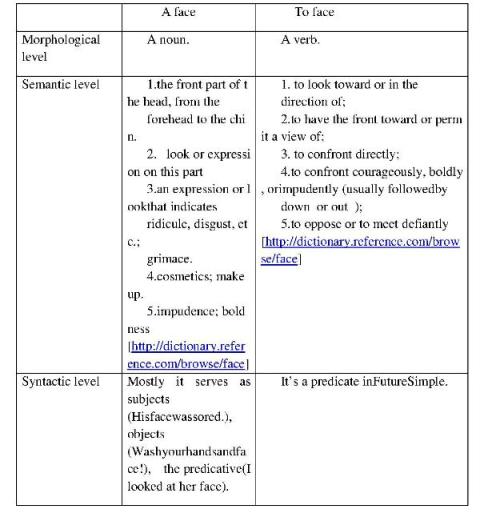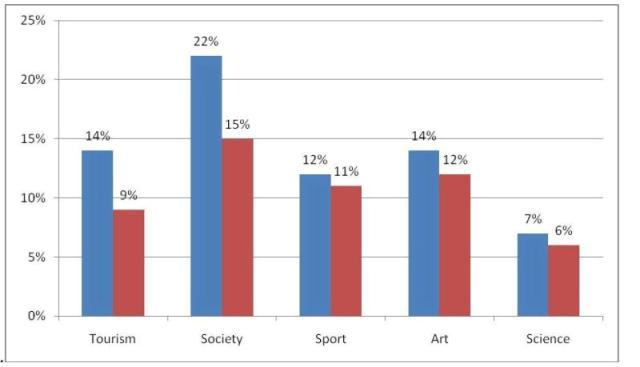Дениско С.М. Сovertion in modern English (on the material of British journalism)
Матеріал з PSYH.KIEV.UA -- Вісник психології і соціальної педагогіки
Дениско Світлана Миколаївна – студентка Педагогічного інституту Київського університету імені Бориса Грінченка, напрям підготовки «Початкова освіта», кафедра іноземних мов і методик їх навчання Київського університету імені Бориса Грінченка
Стаття подає результати дослідження частоти використання конвертації слів у різних сферах британської публіцистики і подає причини популярності даного виду словотворення на сучасному етапі розвитку англійської мови.
Ключові слова: безафіксний спосіб словотворення, конверсія, конвертовані слова, частота використання конверсії, публіцистика.
Статья подает результы исследования частоты использования конвертированых слов в разных сферах британской публицистики и подает причины популярности данного вида словообразования на современном этапе развития английского языка.
Ключевые слова: безафиксный способ словообразования, конверсия, конвертированные слова, частота использования конверсии, публицистика.
The article gives the results of researching the frequency of conversion usage in different spheres of British journalism and provides reasons for the popularity of this affixless type of word-formation in the modern stage of development of the English language.
Key words: affixless derivation way, conversion, converted word, frequency of conversion usage, journalistic style.
Зміст |
Relevance of the topic
The formation of the English language, like any other ones, is continuous. Language is constantly developing. The main criterion for the analysis of speech is the replenishment of its vocabulary. One of the most productive ways of word formation is the conversion. Conversion is widely spread type of word-derivation in many languages, but in English it is particularly prevalent. The major reason for this is that English does not have morphological parameters of parts of speech. And the second reason is that it’s a tendency to simplify English.
The analysis of research
Different aspects of conversion in Modern English are reflected in the works of contemporary scholars. V. Arakin considers this process as root or affixlessword derivation, L. Blumfild, D. Kastovskyy, M. Lenert, L. Lipka, H. Marchand, O.Yespersen count that it’s the zero suffixes. P. Tvardish,Y. Fisyak , M. Postconsider zero derivation. Most researchers, including Ch. Barber, A. Zahoruyko, B. Mazo, O. Smyrnytskyy, Yu. Stepanov, B. Zernov, I. Korunets, O. Kubryakova, M. Ryaschyna, P. Sobolyeva, A. Levytskyy, P. Shtekauer, R. Seymur, called this process conversion. But process of studying the conversion is a synchronic phenomenon, so it requires additional research.
The purpose formulation of research
The purpose of this article is to study the conversion of the modern English language on the material of journalism.
The main material
Conversion is a special type of affixless derivation where a newly-formed word acquires a paradigm and syntactic functions different from those of the original word (by conversion we mean derivation of a new word from the stem of a different part of speech without the adding of any formatives).
As a result the two words are homonymous, having the same morphological structure and belonging to different parts of speech.
Due to the proliferation of conversion scientists have identified a number of classifications of conversion. According to the first classification we distinguish complete and incomplete conversion. The basis of the second classification are parts of speech of converted words. The third classification divides converted words according to the number of words in the word-derivation chain.
A characteristic feature of the conversion is that it usually subjects to widely used words with a simple morphological structure. Some changes happen with new converted word:
1) New word gets all endings which serve to form grammatical forms of new part of speech (shelter – to shelter, hand – to hand, doctor – to doctor, bottle – to bottle).
2) New word gets a different syntactic function. For example, words may be an attribute (This grass is not as green as on the neighbouring plot) and an object (The tastiest dish on this table is a baked chicken with green).
3) New word gets a new lexical-grammatical meaning (witness – to witness, hammer – to hammer, to go – a go, to make – a make).
Journalistic style concern to various aspects of life: culture, sports, tourism, science, the activity of public organizations (environmental, human rights, etc.) and others. To investigate the frequency of use of conversion in British journalism, we have used various British periodicals such as "British Council", "The Guardian", "SIVault" and "Politics.co.uk". We chose 10 articles (2 articles from each topic) that outline the following areas of people's lives as:
1. Sports - "Not going Back There" [2], "Special Forces" [1];
2. Art - "Artwork by apanese patients in care comes to London" [8], "Sky Art hunts for Britain's best portrait artist" [3];
3. Tourism - "Travelling in the UK" [12], "Railroad romance: taking the train from Vancouver to San Francisco" [7];
4. Society - "Working poor face tax hike" [6], "Why are British children so unhappy?" [5];
5. Science - «Making of Europe unlocked by DNA» [11], «Genetic study finds Ice Age salmon refuse» [9].
Each article was processed in terms of frequency of use of conversion. We calculated the proportion of converted words and the total number of words in the article. Converted word is a word which has changes in morphological, semantic, syntactic level.
In the article "Working poor face tax hike" [6] there is a sentence "Over two million poor families will face a significant increase in their council tax in the new financial year, a new report has found". Let's analyze the word “face” (a verb). Compare the features of this word with the word “a face” (a noun), suggesting that they are converted (see Table 1).
The word “to face” has changed at all three levels - morphological (moved into the category of verbs without changing the morphological parameters), change the syntactic values, performs different syntactic role in the sentence (predicate). Thus, it can be considered convertible.
Analyzing the results of our research, we noticed next patterns in the phenomenon of conversion:
1) The conversion of words capable of having a simple morphological structure. Most often it is one or two - syllable words. For example:
- poor (Adj.) – apoor (N.);
- to drop (V.) – a drop (N.);
- a cause (N.) – to cause (V.);
- aplace (N.) – toplace (V.).
2) One of the converted word has a broader semantic meaning. We can assume that specific meaning of the word is derived, and a wider - primary (see Table 2). For example:
3) Mostly converted words are commonly used in everyday life. For example, real (Adj.) - a real (N.) - real (Adv.), a change (N.) - to change (V.), a work (N.) - to work (V.), a game (N.) - to game (V.) - game (Adj.), a lead (N.) - to lead (V.) and others.
Consider an analysis of frequency of use the conversion in British journalism, which are presented in the table (see Table 3.)
As we see in the existing table results, the highest frequency of conversion usage (22%) is in the article “Working poor face tax hike” [6], which belong to the topic "Society." The least converted words are in the article “Genetic study finds Ice Age salmon refuse” [9] (6%) and “Making of Europe unlocked by DNA” [11] (7%) belonging to the topic “Science”.
In other articles, average frequency of conversion usage is varied from 9% to 14%. In the topic “Tourism” [7, 12] the frequency of conversion usage in relation to the total number of words in the article is from 14%till9%, in the “Arts” [3, 8] –from 14% to 12%, in the topic “Sport” [1, 2] –from12% to11%. This indicates that the conversion is wide spread phenomena.
What is the reason that in the topic “Society” there is the highest frequency of conversion usage?
Analyzing the article "Working poor face tax hike" [6] and "Why are British children so unhappy?" [5], which belong to the sphere of public life , it should be noted that it has the following features :
- synthesis of components of scientific, official, business, art and
conversational style;
- lots of words belonging to general use;
- the use of many- shaped vocabulary, emotional and evaluative words, expressive of sustainable phrases, paraphrase ;
- different types of interrogative, exclamatory sentences, inverse of words etc. [10].
It can be concluded that the main cause of the frequent of the use the conversion in the social life is a large number of common words, colloquial, vernacular words which is best able to convert.
But this is not the scientific and journalistic sphere in which the conversion occurs least. Scientific style has the following language features:
• a significant amount of scientific terminology,
• availability of diagrams, tables, charts, graphs , maps, mathematical systems, physical, chemical , and other signs and symbols,
• manipulation of abstract, mostly alien words,
• the use of purely scientific phraseology, terminology stable combinations of words ,
• drawing the quotes and links to the original source,
• lack author mostly individual manner and emotionally expressive vocabulary
• the presence of distinct compositional structure of the text (consecutive division into sections , parts, paragraphs , subparagraphs , paragraphs, indents using the numeric or alphanumeric numbering ).
Thus scientific and journalistic style requires use of scientific vocabulary, terminology, plates, etc., which are not favorable for the conversion [12].
In the articles that belong to topics "Sport", "Art", "Tourism", the number of converted words is about the same. Because there are athletic, musical, artistic, geographical terms in these areas that are not within of general usage. Therefore it does not get a spread in the conversion of both the public topics.
Conclusion
So the main cause of high frequency of usage conversion in the social life is usage of a large number of common words, colloquial, vernacular word. They are often capable of conversion.
The wide spreading convertion in scientific style is explained usage of scientific vocabulary, terminology, plates, etc., which are not favorable for the conversion. While the main cause of frequent of conversion usage in the social life is a large number of common words, colloquial, vernacular words are often capable of conversion. Thus, the highest frequency of conversion usage is in the areas of journalism, which occur most commonly used number of common words.
The relevance of conversion is due to several reasons:
- an absence of English morphological parameters to determine the parts of speech.
- a trend towards English simplification.
Conversion is one of the most productive and easiest ways of word formation. A number of converted English words is growing every year. Therefore, the study of conversion is synchronic phenomenon, and therefore it requires constant research.
References
- Anderson K. Special Forces [Virtual Resource]/ K. Anderson/ IVault // Access Mode:http://sportsillustrated.cnn.com/vault/article/magazine/MAG1207149/index.htm
- Bamberger M. Not going Back There [Virtual Resource]/ M. Bamberger / SIVault // Access Mode : http://sportsillustrated.cnn.com/vault/article/magazine/MAG1207117/index.htm
- Brown M. Sky Art hunts for Britain's best portrait artist [Virtual Resource]/M. Brown// Access Mode : http://www.guardian.co.uk/artanddesign/2013/mar/28/sky-arts-britain-best-portrait
- Dictionary [Virtual Resource]/ Access Mode:http://dictionary.reference.com
- Henley J. Why are British children so unhappy? [Virtual Resource]/ J. Henley/ The guardian // Access Mode : http://www.guardian.co.uk/society/shortcuts/2012/jun/27/why-british-children-so-unhappy
- Hudson T. Working poor face tax hike [Virtual Resource]/ T. Hudson // Access Mode : http://www.politics.co.uk/news/2013/03/28/working-poor-face-tax-hike
- John E. Railroad romance: taking the train from Vancouver to San Francisco [Virtual Resource]/ E. John/ The guardian // Access Mode : http://www.guardian.co.uk/travel/2013/mar/31/railroad-romance-taking-train-vancouver
- Kennedy M. Artwork by apneas patients in care comes to London [Virtual Resource]/ M. Kennedy/ The guardian// Access Mode :
http://www.guardian.co.uk/artanddesign/2013/mar/27/artwork-japanese-patients-care-london
- Kinver M. Genetic study finds Ice Age salmon refuse [Virtual Resource] / M. Kinver / BBC. News. Science and Environment // Access Mode: http://www.bbc.co.uk/news/science-environment-22151865
- News style [Virtual Resource]/ Access Mode: http://en.wikipedia.org/wiki/News_style
- Rincon P. Making of Europe unlocked by DNA [Virtual Resource]/ P. Rincon // BBC. News. Science and Environment / Access Mode : http://www.bbc.co.uk/news/science-environment-22252099
- Travelling in the UK [Virtual Resource]/ British Council // Access Mode : http://www.educationuk.org/Article/travelling-in-the-uk


